人教版新目标八年级下册1-5单元_英语语法知识点精讲+练习
人教版英语八年级下册Unit 1-5 单元语法知识梳理
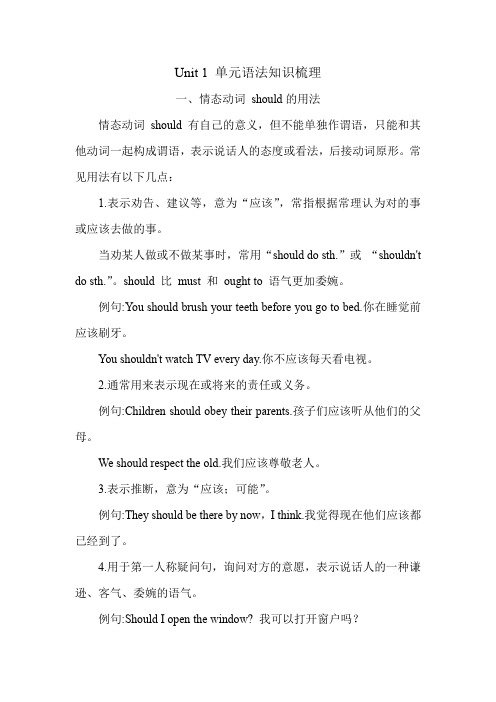
Unit 1 单元语法知识梳理一、情态动词should的用法情态动词should有自己的意义,但不能单独作谓语,只能和其他动词一起构成谓语,表示说话人的态度或看法,后接动词原形。
常见用法有以下几点:1.表示劝告、建议等,意为“应该”,常指根据常理认为对的事或应该去做的事。
当劝某人做或不做某事时,常用“should do sth.”或“shouldn't do sth.”。
should 比must 和ought to 语气更加委婉。
例句:You should brush your teeth before you go to bed.你在睡觉前应该刷牙。
You shouldn't watch TV every day.你不应该每天看电视。
2.通常用来表示现在或将来的责任或义务。
例句:Children should obey their parents.孩子们应该听从他们的父母。
We should respect the old.我们应该尊敬老人。
3.表示推断,意为“应该;可能”。
例句:They should be there by now,I think.我觉得现在他们应该都已经到了。
4.用于第一人称疑问句,询问对方的意愿,表示说话人的一种谦逊、客气、委婉的语气。
例句:Should I open the window? 我可以打开窗户吗?What should we do now? 我们现在该干什么呢?5.表示某种感情色彩,意为“竟会”,常用于以how, why开头引导的特殊疑问句中。
例句:Why should you be so early today? 你今天为什么会如此早?二、反身代词1.反身代词的构成反身代词是一种表示反射或强调的代词。
它由第一人称、第二人称的形容词性物主代词和第三人称代词的宾格加词尾-self或-selves构成。
其构成如下表:反身代词与它所指代的名词或代词形成互指关系,两者在人称和数上应保持一致。
人教版八年级下册各单元英语语法解析知识重点总结
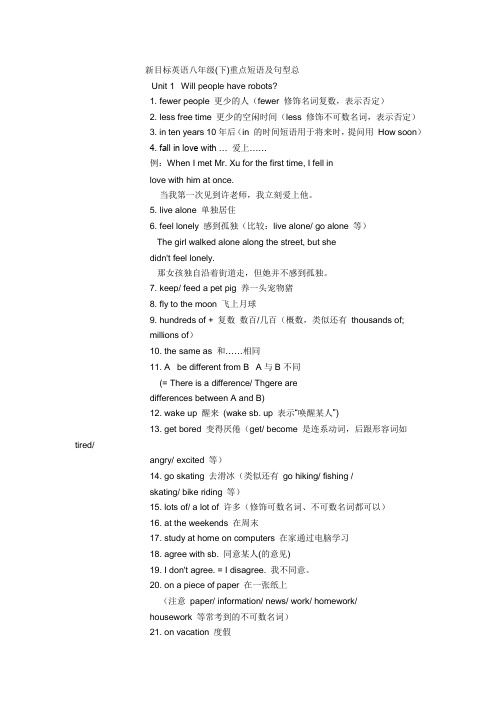
新目标英语八年级(下)重点短语及句型总Unit 1 Will people have robots?1. fewer people 更少的人(fewer 修饰名词复数,表示否定)2. less free time 更少的空闲时间(less 修饰不可数名词,表示否定)3. in ten years 10年后(in 的时间短语用于将来时,提问用How soon)4. fall in love with … 爱上……例:When I met Mr. Xu for the first time, I fell inlove with him at once.当我第一次见到许老师,我立刻爱上他。
5. live alone 单独居住6. feel lonely 感到孤独(比较:live alone/ go alone 等)The girl walked alone along the street, but shedidn't feel lonely.那女孩独自沿着街道走,但她并不感到孤独。
7. keep/ feed a pet pig 养一头宠物猪8. fly to the moon 飞上月球9. hundreds of + 复数数百/几百(概数,类似还有thousands of;millions of)10. the same as 和……相同11. A be different from B A与B不同(= There is a difference/ Thgere aredifferences between A and B)12. wake up 醒来(wake sb. up 表示“唤醒某人”)13. get bored 变得厌倦(get/ become 是连系动词,后跟形容词如tired/angry/ excited 等)14. go skating 去滑冰(类似还有go hiking/ fishing /skating/ bike riding 等)15. lots of/ a lot of 许多(修饰可数名词、不可数名词都可以)16. at the weekends 在周末17. study at home on computers 在家通过电脑学习18. agree with sb. 同意某人(的意见)19. I don't agree. = I disagree. 我不同意。
新目标英语八年级下Unit1—5单元语法考点梳理及精练

总复习Unit 1-5一.Grammar Focus(语法专项复习)一般将来时定义:表示将要发生的动作或存在的状态,目前还没有发生。
结构:1. will/shall(将,会,要)+ 动词原形(will可用于任何人称,shall只能用于第一人称I/W e)I/Y ou/He/She/They/We will have robots at home in 200 years.I/We shall dress more casually.2. be going to +动词原形(发生的可能性较大)①.表示主观打算计划要做某事。
I’m going to sell my old house②.表示说话者根据客观现象推断某事是否会发生。
Look at the clouds! It’s going to rain.3. 现在进行时结构(be + 动词ing)表示将来时(表示按计划、安排即将发生的动作,常用于位置转移的动词。
如:go, come, leave, arrive等)Wait a minute. I’m coming.时间状语:next time/ week/month/year, tomorrow, tomorrow evening, the day after tomorrow(后天), this afternoon/evening, tonight, before long(不久), in the future, in+时间(in ten minutes),soon(很快), later(on)(以后)特殊句型:There be 句型1. 表示“某处(某时)有某人(物)”There are fourteen books in her schoolbag.There was a boy at that time.2.遵循“就近原则”There is a pen and two pencils on the desk.There are two boys and a teacher in the room.3.There be句型的将来时:there will be/there is going to be(后者可能性大于前者)There will be more cars in our city in the future.There is going to be a football game tomorrow.小练:1). 翻译There ________(将有)a movie this evening. People ______(将有)robots in their homes. People ________(将活)to be 200 years old. People______(将用)the subways less. Kids _______ (将学习)at home on computers. Kids _________(将不去)to school to study.2). 把上面句子变成一般疑问句(并作肯定和否定回答)和否定句3). There________some yogurt and two tamatoes on the table.(be)4). There________ three children and a teacher in the classroom.(be)5). There________ a beautiful flower and two hats on the floor last night.(be)6). ________ an English party in our school this evening.A. There will beB. There is going to beC. There will haveD. There is going to have过去进行时定义:表示过去某一时刻或某一段时间一直在进行的动作。
人教新目标八年级下册1-5单元中考重点知识

【 词语解析 】oe h p 可用作动词或名词 , 作
动词 时 主要有 以下几 种用法 : ( 接动词 不定 式 。如 : 1 )
( otf 2 u 和许多动词连用时, ) o 可表示“ 从 出来 ; 由……里 面 向外 ” 。如 :
L o u f t e wi d w,y u wi n o k o t o h n o o l f d li
o sa r 他 每星期从 薪水 中拿 出五美元 f isa . h l y 给我 。
2 a rv . . riel 到达 ,
【 归纳拓展 】o e w s 都可 以表示 “ hp / h i 希
望 ”但 应注意 其异 同 : ,
h p wi os o e} s t d h ho t 、
a ok 他 递 给我一 本书 。 o. b
( ps作“ 2 a ) s 经过 , 穿过” 可用作不及物 解, 动词 , 常与 a n / y/ ho g l g b t uh等连用 ; o r 也可 用 作及 物动词 。如 :
A b s a e yjs amo n g . u s db t me t o 一辆 p s u a
Dr se a e i tl ne ye r a d o e ssm y b n s e o a n ut y
注意 : a gtt) a i i a都可 r c e ( / rv n/ t e h/ o r e( ) 以表示 “ 到达 ”后 接副词 h me/hr hr , o ee/tee 时, 需省略其后的介词。试比较 :
【 归纳拓展 】 短语 o t f u o 有下列几种主要
用法 :
() u f 1 ot 和名 词 连用 时 , O 可表 示 “ 开 , 离
最新人教版八年级下英语期中复习知识点讲义(Unit1-Unit5)

最新人教版八年级下英语期中复习知识点讲义(Unit1-Unit5)Unit 1: What's the Matter?In this unit。
we will focus on two grammar points: the use of the modal verb "should" and reflexive pronouns。
We will also discuss the topic of health in our writing。
Here are some XXX:1."Have a + disease" (e.g。
"have a cold")2.XXX: "What's wrong?" "What's wrong with you?" "What's your trouble?" "What's the trouble with you?"3."Lie" can mean both "to recline" (e.g。
"She should lie down") and "to tell a falsehood" (e.g。
"She lied again")。
"Lay" means "to put something down" (e.g。
"The hen is laying an egg").4.XXX with "if" (e.g。
"If I have time。
I will go to the gym").5."Surprise" can be used as a verb (e.g。
初中英语 人教版新目标 八年级下册Unit5复习(词汇,句型,语法等练习)
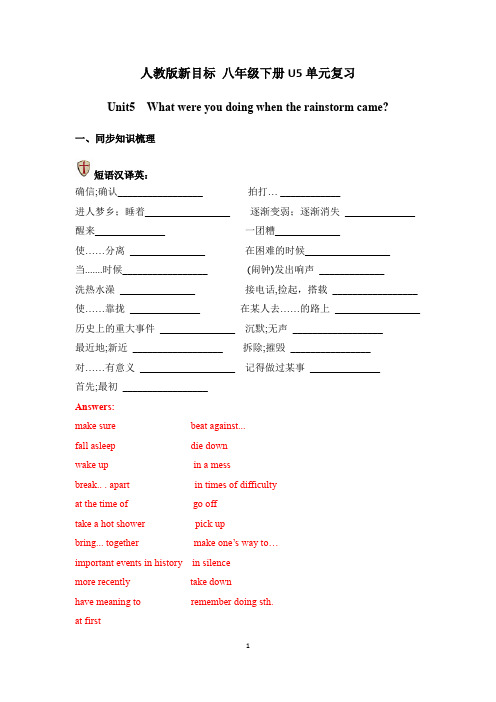
人教版新目标八年级下册U5单元复习Unit5 What were you doing when the rainstorm came?一、同步知识梳理短语汉译英:确信;确认_________________ 拍打… ____________进人梦乡;睡着_________________ 逐渐变弱;逐渐消失______________ 醒来______________ 一团糟_____________使……分离_______________ 在困难的时候_________________ 当.......时候_________________ (闹钟)发出响声_____________洗热水澡_______________ 接电话,捡起,搭载_________________使……靠拢______________ 在某人去……的路上_________________历史上的重大事件_______________ 沉默;无声__________________最近地;新近__________________ 拆除;摧毁________________对……有意义___________________ 记得做过某事______________首先;最初_________________Answers:make sure beat against...fall asleep die downwake up in a messbreak.. . apart in times of difficultyat the time of go offtake a hot shower pick upbring... together make one’s way to…important events in history in silencemore recently take downhave meaning to remember doing sth.at first重点句型与语法翻译句子:(1)我8点又给你打电话了,但你也没有回答。
新版八年级英语下册第一至第五单元知识点总结

34. As a result , he often fell ill and his grades dropped.结果,他常常生病,功课也落下了。
【解析1】as a result 结果(插入语,放在句首,用逗号隔开)Don’t ask him too late into the night, __As a result___ , he is only a small child.【解析2】fall ill 生病fall asleep 入睡35 .The earlier kids learn to be independent , the better it is for their future.孩子们越早学会独立,对他们的未来越好。
【解析】the + 比较级,the + 比较级“越...... 越...... ”The more you smile, the ___ happier____ you will feel.Unit 4 Why don’t you talk to your parents?一、基础知识1.Why don’t you talk to your parents? 你为什么不和你打父母谈谈呢?【解析】Why don't you do sth ?= Why not do sth? 为什么不......呢?【拓展】用于提建议的句型有:(1)What about doing sth ?=How about doing sth? ….怎么样?(2)Why don’t you do sth?= Why not do sth? 为什么不呢?(3)Let’s do sth.让我们一起做某事吧。
(4)Shall we/I do sth?我们做…好吗?(5)had better do/not do sth 最好做/不做某事(6) Will/Would you please do sth 请你做…好吗?(7) Would you like to do sth? 你想去做某事吗?(8)Would you mind doing sth?你介意做某事吗?【回答】(1). 同意对方的建议时,一般用:◆ Good idea./ That’s good idea. 好主意◆OK/ All right./ Great 好/ 行/太好了◆ Yes, please ./ I’d love to 是的/ 我愿意◆ I agree with you 我同意你的看法◆ No problem 没问题◆Sure/ Of course/ Certainly 当然可以◆Yes, I think so 对,我也这样想(2).对对方的帮助或要求表示委婉谢绝时,一般用:◆ I don’t think so 我认为不是这样◆Sorry, I can’t 对不起,我不能◆I’d love to, but…◆ I’m afraid…我愿意,但恐怕……2.I have to study too much so I don’t get enough sleep.我要学的太多,因此我睡眠不足。
人教版八年级英语下册1-5单元知识梳理

八年级(下)新目标英语重点短语及句型总汇Unit 1 Will people have robots?1.fewer people 更少的人(fewer修饰名词复数,表示否定)2.less free time 更少的空闲时间(less修饰不可数名词,表示否定)3.in ten years 10年后(in的时间短语用于将来时,提问用How soon)4.fall in love with…爱上…5.live alone 单独居住feel lonely 感到孤独6.The girl wa lked alone along the street, but she didn’t feel lonely那女孩独自沿着街道走,但她并不感到孤独7.keep/feed a pet pig 养一头宠物猪8.fly to the moon 飞上月球9.hundreds of +复数数百/几百(概数,类似还有thousands of; millions of)10.the same as 和……相同11.A be different from BA与B不同(=There is a difference/There are differences between A and B)12.wake up 醒来(wake sb. up表示“唤醒某人” )13.get bored变得厌倦(get/become是连系动词,后跟形容词如tired/angry/excited等)14.go skating 去滑冰(类似还有go hiking/fishing /skating/bike riding等)15.lots of/a lot of 许多(修饰可数名词、不可数名词都可以)16.at the weekends 在周末17.study at home on computers 在家通过电脑学习18.agree with sb. 同意某人(的意见) I don’t agree. = I disagree.19.on vacation 度假help sb with sth/help sb do sth20.different kinds of goldfish 许多不同种金鱼21.live in an apartment住在公寓里live on the twelfth floor 住在12楼22.live at NO.332,Shanghai Street 住在上海路332号23.as a reporter 作为一名记者look smart 显得精神/看起来聪明24.Are you kidding? 你在骗我吗in the future 在将来/在未来25.no more=not …anymore不再(强调多次发生的动作不再发生)26.no longer=not… any longer不再(强调状态不再发生)27.besides(除…之外还,包括)except =but(除…之外,不包括)28.be able to与can 能、会(be able to用于各种时态,而can只能用于一般现在时态和一般过去时态中;have to用于各种时态,而must只能用于一般现在时态)例如:a I have been able to/will be able to speak two languages.(不可以用can)b had to stay at home/ will have to (不可以用must)be big and crowded 大而且拥挤be in college 在上大学29.live on a space station 住在空间站30.dress casually 穿得很随意casual clothing 休闲服饰31.win the next World Cup 赢得世界杯e true 变成现实take hundreds of years花几百年的时间33.be fun to watch 看起来有趣over and over again一次又一次34.be in different shapes 形状不同twenty years from now 今后20年本单元目标句型:1.What do you think life will be like in 1000 years?2.There will be fewer trees、more buildings and less pollution in the future.fewer;less表示否定之意,分别修饰可数名词和不可数名词;more二者都可以修饰。
新目标英语八年级(下)Unit 1~Unit3知识要点精讲
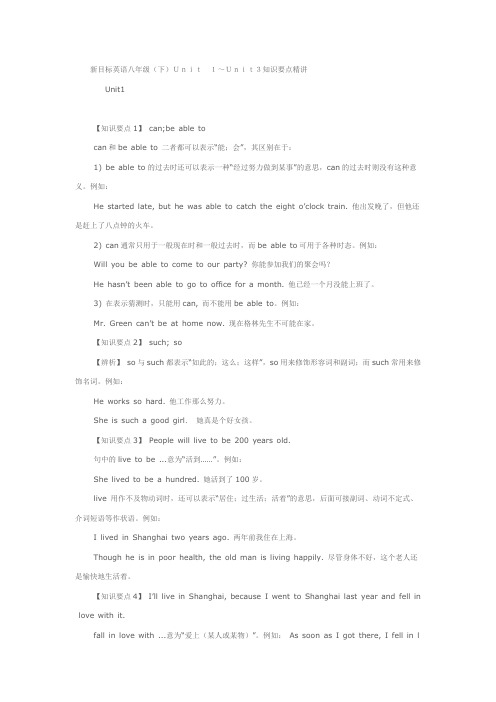
新目标英语八年级(下)Unit1~Unit3知识要点精讲Unit1【知识要点1】can;be able tocan和be able to 二者都可以表示“能;会”,其区别在于:1) be able to的过去时还可以表示一种“经过努力做到某事”的意思,can的过去时则没有这种意义。
例如:He started late, but he was able to catch the eight o’clock train. 他出发晚了,但他还是赶上了八点钟的火车。
2) can通常只用于一般现在时和一般过去时,而be able to可用于各种时态。
例如:Will you be able to come to our party? 你能参加我们的聚会吗?He hasn’t been able to go to office for a month. 他已经一个月没能上班了。
3) 在表示猜测时,只能用can, 而不能用be able to。
例如:Mr. Green can’t be at home now. 现在格林先生不可能在家。
【知识要点2】such; so【辨析】so与such都表示“如此的;这么;这样”,so用来修饰形容词和副词;而such常用来修饰名词。
例如:He works so hard. 他工作那么努力。
She is such a good girl.她真是个好女孩。
【知识要点3】People will live to be 200 years old.句中的live to be ...意为“活到……”。
例如:She lived to be a hundred. 她活到了100岁。
live 用作不及物动词时,还可以表示“居住;过生活;活着”的意思,后面可接副词、动词不定式、介词短语等作状语。
例如:I lived in Shanghai two years ago. 两年前我住在上海。
Though he is in poor health, the old man is living happily. 尽管身体不好,这个老人还是愉快地生活着。
英语八年级下册u1至u5知识点

英语八年级下册u1至u5知识点初中英语学习阶段是学习英语的重要阶段,特别是八年级下册的U1至U5单元是学习英语的基本知识点,这些知识点是英语学习的基础,掌握好这些知识点对以后的学习有很大帮助。
下面就来一一介绍这些知识点:U1 单元该单元主要介绍了各种日常活动和用语。
以下是该单元的知识点:1.动词的ing形式的使用:在现在进行时态中,我们要使用动词的ing形式来表达正在进行的动作。
如:I am reading a book.( 我正在看书)2.关于“go”的使用:go前面要带上所要前往的地方,如电影院、游泳池等,同时go后面要用动词的ing形式。
如:I'm going swimming.(我要去游泳。
)3.表达喜欢或不喜欢的用语:like和dislike是表达喜欢和不喜欢的常用用语,别忘了使用这些词时必须要用动词的ing形式。
如:I like listening to music.(我喜欢听音乐。
)U2 单元该单元主要介绍了日常生活中数字的表达方法以及时间的表达方法。
以下是该单元的知识点:1.英文数字表达:英语数字1~20之间是比较特殊的数字,记忆起来较为困难。
我们要通过一些互动游戏来记忆这些数字。
如:1(one)、2(two)、3(three)…20(twenty)2.表达时间:我们需要熟练掌握时间表达方法,在日常生活中使用时间数字的表达以及掌握am、pm的用法。
如:It's ten past nine in the morning. (早上9点10分)U3 单元该单元主要介绍了时态的使用,包括一般现在时态、一般过去时态、现在进行时态、过去进行时态、一般将来时态等。
以下是该单元的知识点:1.一般现在时态:表示现在的动作或状态,如:My father works in a hospital.(我父亲在医院工作。
)2. 一般过去时态:表示过去发生的事情,如:She watched TV yesterday evening.(昨晚她看了电视。
新人教八年级下英语1—5单元知识点总结

一. 知识点总结:(一)一般将来时一般将来时表示将来某个时间要发生的动作或者存在的状态。
通常与表示将来的时间状语连用,如tomorrow, the day after tomorrow, next year, next month, next week, in 100 years等。
be going to do (动词原形)结构:表示打算、准备做的事情或者肯定要发生的事情。
如:It is going to rain.will do 结构表示将来的用法:1. 表示预见Do you think it will rain?You will feel better after a good rest.2. 表示意图I will borrow a book from our school library tomorrow.What will she do tomorrow?基本构成如下:一般疑问句构成:(1)will+主语+do…? Will Sarah come to visit me next Sunday?(2)there be 结构的一般疑问句:Will there + be …?Will there be fewer trees? Yes, there will. / No, there won’t否定句构成:will + not (won’t)+doSarah won’t come to visit me next Sunday.特殊疑问句构成:特殊疑问词+will+主语+…?What will Sarah do next Sunday?根据例句,用will改写下列各句例:I don’t feel well today. (be better tomorrow)I’ll be better tomorrow.1. Gina has six classes today. (have a lot of homework tonight)_____________________________2. I’m tired now. (sleep later)_____________________________3. My parents need a new car. (buy one soon)_____________________________4. We can’t leave right now. (leave a little later)_____________________________5. The weather is awful today. (be better tomorrow)_____________________________答案:1. She’ll have a lot of homework tonight.2. I’ll sleep later.3. They’ll buy one soon.4. We’ll leave a little later.5. Maybe it’ll be better tomorrow.(二)should的用法:should用来提出建议和忠告,后边加动词原形,否定句直接在should后边加not.例如:I think you should eat less junk food.我认为你应该少吃垃圾食品。
人教版八年级下册各单元英语语法解析知识重点总结
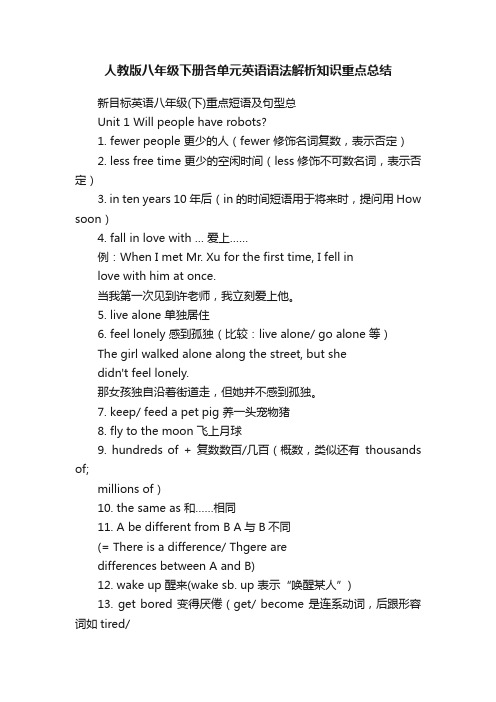
人教版八年级下册各单元英语语法解析知识重点总结新目标英语八年级(下)重点短语及句型总Unit 1 Will people have robots?1. fewer people 更少的人(fewer 修饰名词复数,表示否定)2. less free time 更少的空闲时间(less 修饰不可数名词,表示否定)3. in ten years 10年后(in 的时间短语用于将来时,提问用How soon)4. fall in love with … 爱上……例:When I met Mr. Xu for the first time, I fell inlove with him at once.当我第一次见到许老师,我立刻爱上他。
5. live alone 单独居住6. feel lonely 感到孤独(比较:live alone/ go alone 等)The girl walked alone along the street, but shedidn't feel lonely.那女孩独自沿着街道走,但她并不感到孤独。
7. keep/ feed a pet pig 养一头宠物猪8. fly to the moon 飞上月球9. hundreds of + 复数数百/几百(概数,类似还有thousands of;millions of)10. the same as 和……相同11. A be different from B A与B不同(= There is a difference/ Thgere aredifferences between A and B)12. wake up 醒来(wake sb. up 表示“唤醒某人”)13. get bored 变得厌倦(get/ become 是连系动词,后跟形容词如tired/angry/ excited 等)14. go skating 去滑冰(类似还有go hiking/ fishing /skating/ bike riding 等)15. lots of/ a lot of 许多(修饰可数名词、不可数名词都可以)16. at the weekends 在周末17. study at home on computers 在家通过电脑学习18. agree with sb. 同意某人(的意见)19. I don't agree. = I disagree. 我不同意。
人教版新目标八年级下册1-5单元_英语语法知识点精讲+练习

新目标八年级下册英语语法知识点精讲+练习(一)一般将来时一般将来时表示将来某个时间要发生的动作或者存在的状态。
通常与表示将来的时间状语连用,如tomorrow, the day after tomorrow, next year, next month, next week, in 100 years等。
be going to do(动词原形)结构:表示打算、准备做的事情或者肯定要发生的事情。
如:It is going to rain.will do结构表示将来的用法:1. 表示预见Do you think it will rainYou will feel better after a good rest.2. 表示意图<I will borrow a book from our school library tomorrow.What will she do tomorrow基本构成如下:一般疑问句构成:(1)will+主语+do…Will Sarah come to visit me next Sunday(2)there be 结构的一般疑问句:Will there + be …Will there be fewer trees Yes, there will. / No, there won’t否定句构成:will + not (won’t)+doSarah won’t come to visit me next Sunday.特殊疑问句构成:*特殊疑问词+will+主语+…What will Sarah do next Sunday★★练一练★★根据例句,用will改写下列各句例:I don’t feel well today. (be better tomorrow)I’ll be better tomorrow.1. Gina has six classes today. (have a lot of homework tonight)_____________________________2. I’m tired now. (sleep later)_____________________________3. My parents need a new car. (buy one soon)-_____________________________4. We can’t leave right now. (leave a little later)_____________________________5. The weather is awful today. (be better tomorrow)_____________________________答案:1. She’ll have a lot of homework tonight.2. I’ll sleep later.3. They’ll buy one soon.4. We’ll leave a little later.5. Maybe it’ll be better tomorrow./(二)should的用法:should用来提出建议和忠告,后边加动词原形,否定句直接在should后边加not.例如:I think you should eat less junk food.我认为你应该少吃垃圾食品。
八年级英语下册 1---5单元讲解和练习 人教新目标版

八年级下册Unit 11. People will have robots in their homes.。
will助动词,表单纯的未来。
用于陈述句表“将……,会……”。
e.g. I will (I'll) be 15 next month.Mr. Green will be back soon.否定句:won't = will not eg. He won't be back before 10.will用于疑问句意为“会……吗?”e.g. Will you be free on Frid ay evening?Will people have robots?2. There will only be one country.There will be 是there be句型的将来时。
T here won't be any paper money. (否定)W ill there be less pollution? (疑问)Yes, there will./ No, there won't.T here will be more people. (肯定)※常见错误:there w ill have…3. I think there will be more / less pollution.fewer 与less及more表数量的用法。
(1)few(形容词)“几乎没有,很少的”,修饰可数名词。
其比较级、最高级为规则变化:few-fewer-fewest。
“a few”表示“一些”,“few”带否定含义,“几乎没有”。
例:a few days ago, for a few weeks,He has few friends here. There will be fewer trees.(2)little(形容词)“很少的,几乎没有的”(“小的,幼小的”),修饰不可数名词。
人教版新目标八年级下册15单元英语语法知识点精讲练习

新目八年下册英法知点精 +(一)一般将来一般将来表示将来某个要生的作也许存在的状。
平时与表示将来的状用,如tomorrow, the day after tomorrow, next year, next month, next week, in 100 years等。
be going to do(原形)构:表示打算、准做的事情也许必然要生的事情。
如:It is going to rain.will do构表示将来的用法:1.表示Do you think it will rain?You will feel better after a good rest.2.表表示I will borrow a book from our school library tomorrow.What will she do tomorrow?基本构成以下:一般疑句构成:(1)will+ 主 +do⋯ ? Will Sarah come to visit me next Sunday?(2)there be构的一般疑句:Will there + be⋯?Will there be fewer trees? Yes, there will. / No, there won’t否定句构成: will + not(won’t)+doSarah won’t come to visit me next Sunday.特别疑句构成:特别疑+ will+主+⋯?What will Sarah do next Sunday?★★ 一★★依照例句,用 will改写以下各句例: I don ’t feel well today.(be better tomorrow)I ’ll be better tomorrow.1. Gina has six classes today.(have a lot of homework tonight)_____________________________2. I’m tired now.( sleep later)_____________________________3. My parents need a new car.(buy one soon)_____________________________4. We can ’t leave right now.( leave a little later)_____________________________5. The weather is awful today.(be better tomorrow)_____________________________答案: 1. She ’ll have a lot of homework tonight.2.I ’ll sleep later.3.They ’ll buy one soon.4.We’ll leave a little later.5.Maybe it ’ll be better tomorrow.(二) should 的用法:should用来提出建和忠告,后加原形,否定句直接在should 后加 not.比方: I think you should eat less junk food.我你少吃垃圾食品。
- 1、下载文档前请自行甄别文档内容的完整性,平台不提供额外的编辑、内容补充、找答案等附加服务。
- 2、"仅部分预览"的文档,不可在线预览部分如存在完整性等问题,可反馈申请退款(可完整预览的文档不适用该条件!)。
- 3、如文档侵犯您的权益,请联系客服反馈,我们会尽快为您处理(人工客服工作时间:9:00-18:30)。
新目标八年级下册英语语法知识点精讲+练习(一)一般将来时一般将来时表示将来某个时间要发生的动作或者存在的状态。
通常与表示将来的时间状语连用,如tomorrow, the day after tomorrow, next year, next month, next week, in 100 years等。
be going to do(动词原形)结构:表示打算、准备做的事情或者肯定要发生的事情。
如:It is going to rain.will do结构表示将来的用法:1. 表示预见Do you think it will rain?You will feel better after a good rest.2. 表示意图I will borrow a book from our school library tomorrow.What will she do tomorrow?基本构成如下:一般疑问句构成:(1)will+主语+do…? Will Sarah come to visit me next Sunday?(2)there be 结构的一般疑问句:Will there + be …?Will there be fewer trees? Yes, there will. / No, there won’t否定句构成:will + not (won’t)+doSarah won’t come to visit me next Sunday.特殊疑问句构成:特殊疑问词+will+主语+…?What will Sarah do next Sunday?★★练一练★★根据例句,用will改写下列各句例:I don’t feel well today. (be better tomorrow)I’ll be better tomorrow.1. Gina has six classes today. (have a lot of homework tonight)_____________________________2. I’m tired now. (sleep later)_____________________________3. My parents need a new car. (buy one soon)_____________________________4. We can’t leave right now. (leave a little later)_____________________________5. The weather is awful today. (be better tomorrow)_____________________________答案:1. She’ll have a lot of homework tonight.2. I’ll sleep later.3. They’ll buy one soon.4. We’ll leave a little later.5. Maybe it’ll be better tomorrow.(二)should的用法:should用来提出建议和忠告,后边加动词原形,否定句直接在should后边加not.例如:I think you should eat less junk food.我认为你应该少吃垃圾食品。
She drives a lot and she seldom walks. So I think she should walk a lot.她经常开车,很少走路。
所以我认为她应该多走路。
Students shouldn’t spend too much time playing computer games.学生们不应当花太多的时间玩计算机游戏。
学习向别人提建议的几种句式:(1)I think you should…(2)Well, you could…(3)Maybe you should …(4)Why don’t you…?(5)What about doing sth.?(6)You’d better do sth.★★练一练★★用should或shouldn’t填空1. I can’t sleep the ni ght before exams.You ______ take a warm shower before you go to bed.2. Good friends ______ argue each other.3. There is little milk in the glass. We _______ buy some.4. They didn’t invite you? Maybe you ______ be friendlier.5. I am a little bit overweight. So I think I _______ do exercises every day.答案:1. should 2. shouldn’t3. should 4. should 5. should(三)过去进行时过去进行时表示过去某一点时间正在进行的动作或者过去某一段时间内一直进行的动作。
1. 构成was /were + doing,例如:I was watching TV at 9 o’clock last night.at 9 o’clock last night是时间点They were playing football all afternoon.all afternoon是时间段2. 过去进行时的标志词at 8 o’clock last night, this time yesterday等。
例如:I was having lunch at home this time yesterday.昨天的这个时候我正在吃午饭。
At that time she was writing a book.那阵子她在写一本书。
(表示她在那段时间里一直在做那件事情。
)★★练一练★★用括号中所给动词的适当形式填空。
1. This time yesterday I ____ ______(read)books.2. At 9 o’clock last Sunday they ______ ______(have)a party.3. When I _____(come)into the classroom, she ________ ______(read)a storybook.4. She _____ ______(play)computer games while her mother ____ ______(cook)yesterday afternoon.5. I _____ ______(have)a shower when you _______(call)me yesterday.答案:1. was reading 2. were having 3. came; was reading4. was playing; was cooking5. was having; called(四)间接引语形成步骤:(1)不要逗号,冒号,引号(2)要考虑到人称的变化(人称的变化与汉语是一致的)(3)要考虑时态的变化(4)要考虑时间状语、地点状语和语示代词的变化。
1.2.用括号中所给动词的适当形式填空。
1. She said I _____(be)hard-working.2. Peter told me he _____(be)bored yesterday.3. She said she _____(go)swimming last Sunday.4. Bobby said he _____(may)call me later.5. Antonio told me he _____(read)a book then.答案:1. was 2. was 3. went 4. might 5. was reading 请转述他人说的话:1. I go to the beach every Saturday. (Tom)2. I can speak three languages. (Lucy)3. I will call you tomorrow. (Mike)4. I’m having a surprise party for Lana. (she)(五)if引导的条件状语从句结构:if+一般现在时,主语+将来时含义:如果……,将要……例如:If you ask him, he will help you.如果你请求他,他会帮助你。
If need be, we’ll work all night.如果需要,我们就干个通宵。
★★练一练★★根据中文提示,完成句子。
1. 如果你参加聚会,你将会过得很开心。
If you ________ the party, you __________.2. 如果明天下雨,我们将不去野餐。
If it __________ tomorrow, we ___________.3. 如果你经常听英文歌,你将会喜欢英语的。
If you often ________, you _________________.答案:1. If you go to the party, you will have a good time2. If it rains tomorrow, we won’t go to the picnic3. If you often listen to English songs, you’ll like English二. 完形填空特点及解题思路(一)题型分类与特点完形填空试题是在给出的一篇短文中有目的地拿掉若干个词,留下一些空格,要求考生借助短文保留的部分,从所给的短文整体出发,在正确理解短文意思的基础上,根据句子和句子间的内在联系、词的用法和习惯搭配等,用适当的词或词语填空,使补全后的短文意思通顺、前后连贯、结构完整。
这种题型测试的内容从形式上看是单词或短语的填空,但它必须注意到短文中上、下文意思连贯、词语搭配和语法结构正确,所以在空格上所填的词必须符合语义适用和语法正确两条原则,只考虑某一侧面都可能导致错误。
中考中完形填空试题的基本题型分两类:完形填空选择题和完形填空题。
1. 完形填空选择题:该题型的特点是将一篇短文中若干词语抽掉留下空格,对每一空格提供若干个选择项,要求考生通读短文后,在理解短文意思的基础上,运用所学的词汇、句型、语法等语言知识,从所提供的备选项中选出一个最佳答案,使短文内容完整正确。
